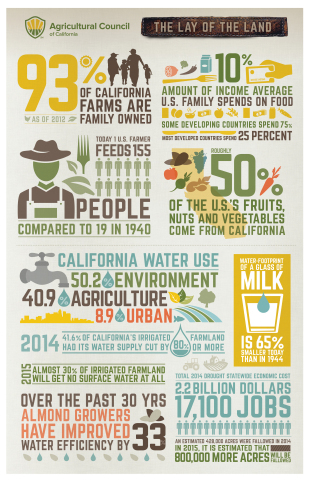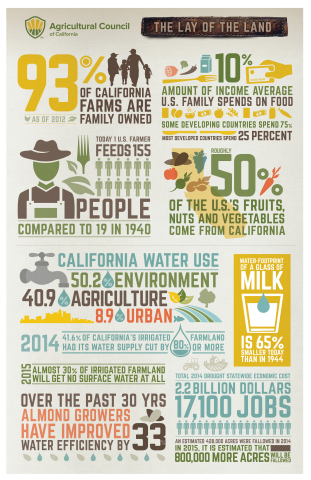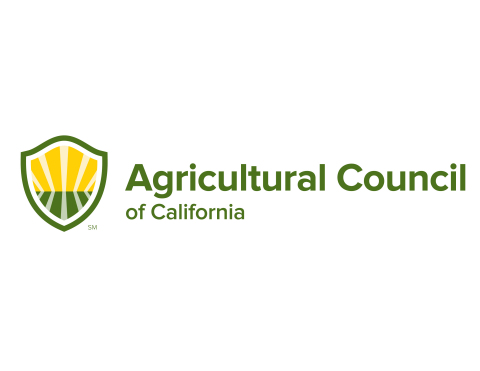SACRAMENTO, Calif.--(BUSINESS WIRE)--Preparing for a fourth consecutive summer of severe drought, California residents also face growing concern and confusion over how the shrinking water supply affects their everyday lives. With new restrictions being placed on urban use and questions being raised about the farming industry’s total water consumption, Agricultural Council of California (Ag Council) is stepping up to address inaccuracies and provide vital information on behalf of its members, California’s food producers.
“It shouldn’t be green lawns versus green vegetables,” said Ag Council President Emily Rooney. “We are all in this together, and we want Californians to understand how the drought is affecting small family farms and the food supply by providing reliable, consistent information.”
More than 41 percent of California’s irrigated farmlands have already received deep cuts. With lawmakers debating the curtailment of groundwater rights, some established as far back as 1914, the situation for food producers could become even direr. With 600,000 acres of farmland expected to be fallowed this year, a 30 percent increase over 2014, the existing water restrictions could result in over 23,000 farm-related jobs lost and a potential $5.7 billion economic hit this year. Last year, water restrictions caused over 17,000 farm-related jobs to be lost and cost the California economy $2.2 billion.
To curb additional losses, Rooney says farmers continue to do their part by increasing efficiency as they’ve done for years. “Conservation is nothing new to agriculture,” Rooney stated. “Farmers have been using technology to increase efficiency of water use for nearly 30 years.” Most farms now incorporate water-saving drip irrigation and plant crops that generate more value with less water.
These efficiency gains apply to individual farms and industry subsets alike. For example, despite a recent media focus on how much water they use, almond growers using advanced production practices have helped improve their water efficiency by 33 percent for every pound of almonds grown today. And almond growers aren’t alone. The water-footprint of a glass of milk is 65 percent smaller today than in 1944, and similar improvements may be seen in all sectors of California agriculture. California farmers are extraordinarily efficient with water, as crop production has risen 43 percent between 1967 and 2010 per acre foot. Today, one farmer can feed 155 people every day for a year as a result of new technologies and more efficient farming practices, compared to 19 people in 1940.
“In addition to farmers improving water efficiencies, agricultural water allocations have been cut significantly, and the cuts involve greater repercussions for future generations of producers and our food supply,” said Rooney. On average, the water supply for California farmers from Redding to Bakersfield has been cut by 70 percent, and 44 percent of California’s farmland will receive no surface water allocations at all in 2015. “Quite simply, farmers are already facing devastating cuts in the ongoing drought,” stated Rooney.
According to the California Department of Water Resources, agriculture accounts for 40.9 percent of California’s water source annually, not the previously reported 80 percent cited in the media, which excluded water use preserved for environmental purposes. “We know California residents understand the difference between taking shorter showers and risking our state legacy of fresh fruits and vegetables,” said Rooney. “We just want to make sure they have the facts. On behalf of all the small family farmers and large growers alike, we’re here to set the record straight. Misinformation doesn’t grow anything but frustration and hype.”
Learn more about how the drought has affected our nation’s breadbasket and what California farmers are doing to help conserve, by visiting www.agcouncil.org.
Media Notes
Related Links:
About Agricultural Council of California
Founded in 1919, Agricultural Council of California (Ag Council) is a member-supported organization advocating for more than 15,000 farmers across California, ranging from farmer-owned businesses to the world’s best known brands. Ag Council works tirelessly to keep its members productive and competitive, so that agriculture can remain California’s number-one industry and members can continue to produce the highest quality food for the entire world. Ag Council brings together diverse interests of farmer-owned and operated businesses to form a united voice on critical issues. For more information about the Agricultural Council of California call 916-443-4887 or visit agcouncil.org.




